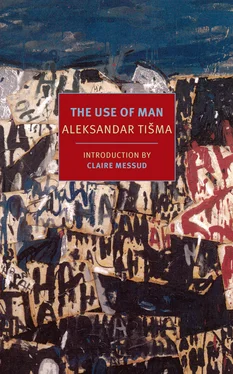Aleksandar Tišma - The Use of Man
Здесь есть возможность читать онлайн «Aleksandar Tišma - The Use of Man» весь текст электронной книги совершенно бесплатно (целиком полную версию без сокращений). В некоторых случаях можно слушать аудио, скачать через торрент в формате fb2 и присутствует краткое содержание. Год выпуска: 2014, Издательство: NYRB Classics, Жанр: Современная проза, на английском языке. Описание произведения, (предисловие) а так же отзывы посетителей доступны на портале библиотеки ЛибКат.
- Название:The Use of Man
- Автор:
- Издательство:NYRB Classics
- Жанр:
- Год:2014
- ISBN:нет данных
- Рейтинг книги:5 / 5. Голосов: 1
-
Избранное:Добавить в избранное
- Отзывы:
-
Ваша оценка:
- 100
- 1
- 2
- 3
- 4
- 5
The Use of Man: краткое содержание, описание и аннотация
Предлагаем к чтению аннотацию, описание, краткое содержание или предисловие (зависит от того, что написал сам автор книги «The Use of Man»). Если вы не нашли необходимую информацию о книге — напишите в комментариях, мы постараемся отыскать её.
A work of stark poetry and illimitable sadness,
is one of the great books of the 20th century.
The Use of Man — читать онлайн бесплатно полную книгу (весь текст) целиком
Ниже представлен текст книги, разбитый по страницам. Система сохранения места последней прочитанной страницы, позволяет с удобством читать онлайн бесплатно книгу «The Use of Man», без необходимости каждый раз заново искать на чём Вы остановились. Поставьте закладку, и сможете в любой момент перейти на страницу, на которой закончили чтение.
Интервал:
Закладка:
Taking their leave of the proprietor, they went out into the street, into snow, and saw a peasant cart with a small horse, its head lowered. In the cart were two elderly peasants and a fat woman wrapped in a black shawl with a child on her knees.
“You didn’t say there would be other passengers,” protested the lawyer.
“That’s the way it is, sir,” retorted the driver with an impudent grin, tightening the horse’s harness. “Take it or leave it.”
They climbed into the cart, squeezed past the other passengers, and found a place for themselves on a thin layer of straw. The driver jumped on in front (there was no seat for him, either), sat on the floor of the cart with his legs hanging over the side, and cracked the whip. The little horse set off at a canter, slowed down at once, and continued at an even walking pace. Under the heavy sky, along the slushy road, side by side with columns of soldiers marching into captivity, they covered, just barely, the distance to Obrenovac by evening. The driver unloaded them at the marketplace and announced that he was returning to Ub.
“We agreed that you would take us to Belgrade! That’s why I gave you a thousand dinars.” Lazukić was the only one to object.
“I don’t know anything about that! There’s a war on!” replied the driver gruffly. He whipped the horse. Yet as he was turning the cart around, he shouted over his shoulder, “Go see if there’s a train.”
This they did at once, and at the railroad station found out that there would be a train for Belgrade the next morning. They spent the night in the waiting room, and the next day, just before noon, the train was ready. Without tickets — the ticket office was closed — they jumped into a car, along with hundreds of people carrying suitcases and bundles. The train lurched and rattled along for four hours, until it reached Belgrade.
Lazukić and Sredoje set off on foot. Directly opposite the station, they saw the first heavily damaged building, around which a group of men were digging, supervised by armed Germans. There were ruins on every street, mansions and shacks reduced to the equality of rubble. Bricks and mortar lay everywhere. They had to make their way around them or, in places, climb over. Closer to the center, there was less destruction, but at one corner they came across a corpse: a man stretched out, feet in low shoes, legs spread wide, body and head covered with wrapping paper held down by half a brick, which someone had placed there to keep it from blowing away. From beneath the corpse had come a dark pool of blood, now coagulated, like jelly. Down the street a German soldier in a steel helmet with a machine gun across his chest, guarding a gate, looked at them hard. “They mean business,” Lazukić whispered to Sredoje after they passed the soldier, and he quickened his pace. “As long as we find my good friend at home. Where else could we go tonight?”
At Terazije they entered a multistoried building, climbed to the third floor, walked all the way down a corridor open to a courtyard, knocked on a door. Nemanja Lazukić threw his arms around the heavy man with a mane of black hair and a neatly trimmed mustache who came out in his shirtsleeves, squinting suspiciously. “Spaso, brother, it’s an evil hour that brings us together.”
18
Other departures from home.
Sep Lehnart’s, on an early morning in May 1941, in blue trousers too short for him, in a white shirt and canvas shoes with worn rubber soles that let through the cold of the earth. Bareheaded, his hair newly cut, and carrying a small parcel of food his mother had prepared for him and silently, tearfully pushed into his unwilling embrace before letting him go and awkwardly walking after him as far as the gate to wave farewell. Pride and shame. Straightening his shoulders, so everyone can see how grown-up and determined he has become, but pressing the parcel against his thigh so no one will notice it. Just trying to get through the streets as quickly as he can. But no, let it last as long as possible, let everyone watch him from behind the curtains secretly drawn in front of their thumping cowards’ hearts. Girls still asleep in their high beds, in white linen nightgowns, with the scent of their bodies beneath the eiderdown, while here, a mere two meters away, strides tomorrow’s soldier, hard, pitiless, ready for the ordeals of battle. Degenerate Germans, those neighbors of his, fat-bottomed, dull-witted, greedy for a mother’s chicken paprikash and a new motorcycle. Rich, they don’t understand that wealth is uncertain if not backed by force, here in a foreign land where the people would happily drive them out with jeering whistles and stones. Wealth-weakness, wealth-sin. Only the wealth of an entire nation is justified: as a means for it to spread worldwide, in the cause of power everlasting.
At the cross-street he passes Heim’s house — where he used to roll barrels, suffer blows — the house pretending to be padlocked, with shutters lowered on its dozen windows: We’re not here, we don’t exist. To smash that silence, that sniveling, that false humility, to break the gate, the windows, and drag them, the bloodsuckers, out by their fleshy bat ears — the bearded old man, his bald, weak-eyed wife, and his repressed son — onto the dirty street, to wipe it with their faces in atonement for having lifted their hands against a German. His muscles are quivering; it’s he who has to be silent now. Restraint, denial of vengeance, not being allowed the pleasure of a personal settling of scores. Everyone will settle scores with everyone, but impersonally, coldly, when the order is given, when the time comes.
Down there on Dudarska Street the truck is revving up. Could he be late? He breaks out in a sweat; he has no watch, but he knows that he started well ahead of time. But here comes one of his companions, along the opposite side of the street, not hurrying. His friend at least has a bag, old and shapeless, it’s true, his father’s locksmith’s bag, but not a bundle deprived of any sign of profession. Perhaps Sep could ask him to take the parcel and put it in the bag. But that would draw attention, it’s better to say nothing, and anyway, why not be proud of his poverty, the fact that all his provisions are wrapped in a sheet of paper and held in one hand? Is it not a state that already belongs to the past? The boys on the truck are humming, two of them are jostling, to get warm. But Sep is no longer cold, he is warmed up from walking and also at the thought of leaving.
Here’s the driver, a real soldier, in uniform, hands in his pockets, cigarette hanging out of his mouth. Is it far? No one knows, it’s a military secret. Good. As far as Sep is concerned, they can go to the ends of the earth and never again set eyes on this selfish village and its people with no honor and no backbone. He puts his hand on the truck’s cold metal side, to climb on, but his parcel is in the way. He drops it, the paper comes open, two pork chops roll into the grass. He sweats again. Did anyone notice? They’re laughing, but fortunately not at him; one of his comrades slipped in the scramble and fell into the truck. Sep clambers over the side. From now on, if anyone asks, the package is not his. If only they would get moving as quickly as possible.
Reza Kroner’s departure in the autumn of 1944. Flight. Shaken by the uncertainty of whether they will leave or not, uncertain night after night next to Hermann in bed, often with no embrace, for he is exhausted, having to run around all day long with messages; there are too few men left, what with all the larger units withdrawn. Rumors. Snoring, waking, listening to the distant rumble, it’s the guns, she knows, though it’s the first time she’s heard them. But he denies it. No, the Russians aren’t coming, he knows for sure, he’s been told, they’ll be stopped by a counterattack from the flank, near Belgrade and in Hungary. You’re crazy, Hermann, she tells him, you’re blind, the last faithful dog, can’t you see that everyone is running, even the captain has left, and that lieutenant will, too, we’ll be the last two left, they’ll shoot us, I don’t want to be shot, I’ve suffered enough, you killed my son, I can’t go on. She keeps on at him until he shuts her up with “Jewish whore!” Silence. In the morning her eyes are burning, as soon as he leaves she falls into a deep sleep and dreams of water.
Читать дальшеИнтервал:
Закладка:
Похожие книги на «The Use of Man»
Представляем Вашему вниманию похожие книги на «The Use of Man» списком для выбора. Мы отобрали схожую по названию и смыслу литературу в надежде предоставить читателям больше вариантов отыскать новые, интересные, ещё непрочитанные произведения.
Обсуждение, отзывы о книге «The Use of Man» и просто собственные мнения читателей. Оставьте ваши комментарии, напишите, что Вы думаете о произведении, его смысле или главных героях. Укажите что конкретно понравилось, а что нет, и почему Вы так считаете.












